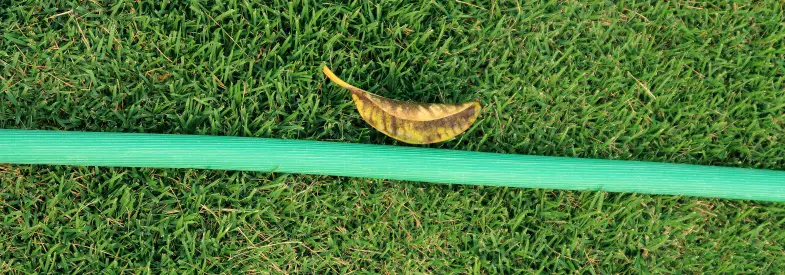A garden hose whether it’s a made of rubber, vinyl or polyurethane is one of those tools that is used constantly throughout the year for the lawn and garden, but also for some home maintenance tasks and even washing the car.
All styles will come in the standard option of being either 5/8 inch or ¾ inch since and come in lengths of 25 to 100 feet. Depending on your needs you may find a rubber garden hose better than vinyl or polyurethane or the latter versions may be best. Be conscious of the hose diameter to match your faucet and the materials as a brass fitting will always be better quality and more expensive than any other types of fittings and can significantly change the price of the hose when comparing options.
The following guide covers the differences between these different materials that a garden hose can come in.
Rubber Hose Overview
- Durability – There is nothing more durable than a 100% rubber hose. They will last the longest and can take the most abuse.
- Heavy and Bulky – The biggest downside for a rubber hose is that it can be heavy and slightly difficult to roll up on a hose hanging rack, especially longer hoses.
- Can be Reinforced – There are versions that are combined with vinyl to provide an even stronger and more durable hose.
- Resistant to Kinks – Rubber hoses are the best for avoiding kinks and unusual bends that cause disruptions in the flow of water
- Very Flexible– Being flexible makes it easy to wind back up into the coil on a hose rack with a nice uniform look.
- Do Not Decay in Sunlight – Many hose materials will rapidly degrade over the course of a season when left out in the sun. It can often be convenient to leave a hose out instead of winding into a hose bin and rubber garden hoses are the most resistant to damage from the sun.
- More Expensive – A rubber hose will last many years longer than a typical vinyl or polyurethane hose, so when you adjust the cost over the life of the hose, they ultimately will be cheaper.
Vinyl Hose Overview
- Very Affordable– The number one advantage of a vinyl hose is that they are cheap. You can get a hose and it will work for the season.
- Typically, Unreinforced– The least expensive hoses will not be reinforced meaning that they should only be used for basic uses and if you are rough on them or plan on using them extensively, they will have a short lifespan.
- Kinks and Permanent Bends – A vinyl hose is the most likely hose to get bad permanent kinks and bends that no matter how much work you put into them to straighten out they will persist. This can be frustrating to use and is one of the major reasons for hoses eventually getting leaks and holes from the continued bending.
- Reinforced Options – A vinyl hose can be combined with a mesh material to help reduce kinking and tangling and make them the lifespan a little better.
Polyurethane Hose Overview
- Much Lighter than Rubber – A quality rubber hose of similar length will weigh twice as much as a polyurethane hose; this is the biggest advantage for a polyurethane hose over a rubber hose.
- Can Eventually Crack – When left baking in the sun the polyurethane will not last near as long as the rubber garden hose and will eventually crack.
- Coiled Versions – Polyurethane hoses can come in wound up coiled versions that make working with around the yard as they are very easy to move from one location to another.
- Very Resistant to Kinks – Polyurethane has zero kink memory so if you do get a kink in a tangle it will not be the start of a never-ending nightmare like with vinyl hoses and sometimes with even a rubber hose.
- Pressure Rating – A polyurethane hose is actually slightly stronger than rubber when its pressure rating a similar size polyurethane hose is rated up to 160 PSI while a rubber hose of the same size will be rated to 150PSI. Although this is unlikely to come in to play for most home lawn and garden uses and even for commercial purposes.
Commercial Grade Garden Hoses
All professionals with commercial grade hoses are using rubber hoses and for a very good reason. They last the longest and can take the most abuse day in and day out. Despite the extra weight the resistance to kinks, ability to be exposed to the elements, and overall durability make rubber garden hoses the choice of professional lawn and garden companies and serious home gamers.
Which Hose is Safer for Drinking?
While drinking straight from the hose is now considered against the rules because of the bacteria that does persist in the hose in between uses. There are other reasons to be cautious for drinking from a hose. Many garden hoses are made without regulations and can contain chemicals or heavy metals such as lead which are dangerous to consume.
If you will be gardening organically, filling up the dog’s water, or taking a drink yourself make sure and check the label. Seek a hose that has the words lead-free and drinking water safe. You will likely have to pay a little more for this type of hose, but for homeowners with young children it is wise to purchase a drinking water safe hose.
What About Rubber and Vinyl Combination Hoses?
There is an option to go with a rubber hose with vinyl reinforcement. These blended hoses can provide the best of both worlds on most fronts. They are cheaper than a rubber hose and are overall lighter. They provide a stronger and more durable solution than a regular vinyl hose and remain flexible and while they may not last as long as a high end rubber hose, you will get multiple years of use out of a quality combination rubber and vinyl hose.
Does the Hose Length Matter for Type of Hose?
No, the length ultimately doesn’t impact the hose, but you may want to consider buying a couple of shorter hoses if you go with a rubber hose as a 100-foot hose can be heavy. Getting two 50-foot hoses or a 50 and a 25-foot hose can be a great strategy for getting to those further distances from the house when you need it without having to lug the whole hose the entire distance.
The only time it may make a big difference is if you are looking for a compact coiled hose. These types of hoses are generally smaller in length and can be easy to store in a small location. A polyurethane hose is the best option for a coiled hose.
Conclusion
Are rubber hoses better than vinyl or polyurethane hoses? Yes. They are a better-quality hose that will last for many years even when they are treated roughly and used daily. Each type of hose has its unique benefits when comparing cost, durability, resistance to kinks, weight, and more, but the overall winner has to go to the classic rubber garden hose.
Just like every homeowner with a lawn needs a lawn mower, you need a good hose and you get what you pay.Consider paying up for a quality rubber garden hose with brass fittings and you will have a hose that can last a lifetime if you take care of it.

